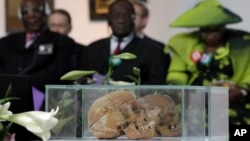Thousands of people in Botswana whose ancestors came from Namibia are demanding reparations for genocide they say was committed by German forces more than a century ago. Namibia is negotiating with the German government, but the descendants say they are being left out of the talks.
In the early 1900s, German colonizers in Namibia killed thousands of people from three tribes -- the Ovaherero, Ovambanderu and Nama – for taking in an uprising. There are no official figures on how many people were killed.
Some of the Ovaherero, Ovambanderu and Nama later settled in Botswana, and their descendants live there today.
This week, Botswana’s minister of presidential affairs, Kabo Morwaeng, told parliament that Botswana has been facilitating dialogue between the Namibian government and the affected groups.
"Batswana of Namibian descent who have approached the government for assistance on the issue of reparations for the genocide, while their specific numbers are unknown as they are represented by a committee, are accordingly receiving assistance arranged by Botswana under a process that has been established by the government of Namibia for a negotiated settlement,” said Morwaeng.
Morwaeng added Botswana cannot do anything more than facilitate dialogue because the issue involves sovereign states -- Namibia and the Federal Republic of Germany.
But legislator Carter Hikuama, who represents some of the affected descendants in parliament, is unhappy with the Botswana government.
"We need their facilitation; we need their support," Hikuama said. "We are not expecting the government of Botswana to negotiate on behalf of these people. We want the government of Botswana to facilitate the negotiations and allow these people to access the Germany.”
Edwin Saidoo is the vice chairperson of the Botswana Society of the Nama, Ovambaderu and Ovaherero tribes. He says the group displeased.
"Let me be very frank, with regards the government of Namibia, in no unambiguous terms we have not had any assistance, save for a suggesting that was made in one sitting where we had thought we will be given a chance to be part of the negotiating table as those in the Diaspora," Saidoo said.
He urges the Namibian government to open up talks to include affected communities abroad.
"Our expectation is only for the government of Namibia to open up the talks instead of making them a bilateral negotiating between it and the Federal Republic of Germany," Saidoo said. "The talks need to be approached, in our view, from a multinational view and therefore include and encompass all the nations and states that hold the diaspora who are also from the affected communities."
In May of this year, Germany officially apologized to Namibia for the killings, and has promised development aid worth $1.2 billion, as part of the compensation to the affected to communities
However, some descendants of the victims in both Namibia and Botswana are angry at the offer, which has been described as an insult by traditional leaders, because it does not include payments for reparations.




